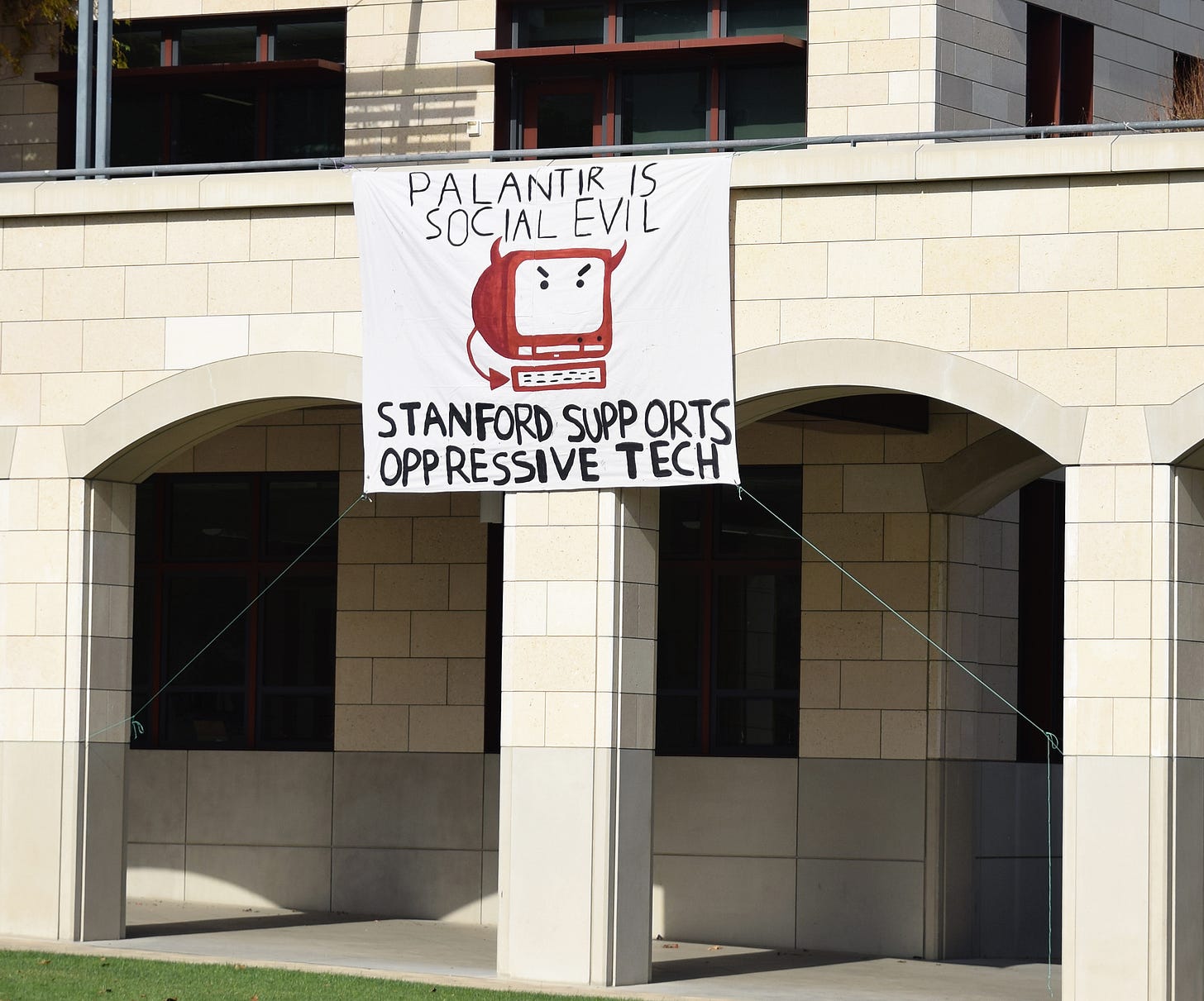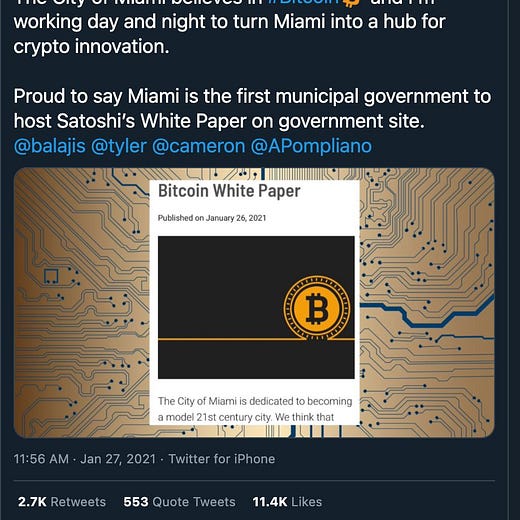One of the toughest hurdles in learning about justice—and the most common question we get at our events—is making the jump from theory to practice. Wow, the world kinda sucks. What do I do about it? That's why I'm excited to share this interview on tech and community organizing with one of my closest friends and greatest inspirations.
Theresa Gao (she/they/她) spent years as a software engineer at companies like Stitch Fix and Twilio before changing her major to Ethnic Studies and dedicating herself to activism. She was on the founding team of the student #NoTechforICE movement and has worked as a digital organizing fellow at the Chinese Progressive Association and Asian Americans Advancing Justice. She's passionate about work in disability justice and movement building tech.
(We're also testing out an interview instead of an essay today—reply to let me know what you think of this format!)
⚒️ it's time to build (a movement)
This interview has been edited for length and clarity. JS = Jasmine Sun, TG = Theresa Gao.
JS: How did you get into tech? Why was that appealing to young you?
TG: I learned to code in a diversity program, so my technical background was shaped by the fact that I was surrounded by technologists who came from marginalized identities, and who were therefore motivated to make impact.
That changed as I got more into it. I first turned to hackathons because I really liked the idea of building something you're passionate about—there's not that much time to really work on random ideas you're interested in. But over time, I started to realize that hackathons themselves are super corporate spaces.
JS: So what was your radicalizing moment?
TG: I feel like radicalization is less a moment and more of a process. It started with my family—my dad was always really political, he took me to SF Pride when I was a kid—so it was nice to have exposure to political conversations early on.
One of the pivotal points in that process was developing some cynicism about diversity: I started out coding in a diversity program, so I always thought these programs were important. But once I spent time at a tech company, I saw that no matter how diverse the company was, it didn't matter if you don't actually support your workers or create environments that care about them beyond their ability to produce labor.
This made me realize it's not about a company, it's not about statistics—it's about a system.
JS: That's a good place to start talking about NoTechForICE—you were super involved at Stanford. But I feel like the movement often comes down to where a person individually works. How do you frame that campaign in a systemic context rather than blaming individuals?
TG: NoTechForICE pushed me to look past where do I decide to work, which is a temporal, individual problem, to broader questions like why did these companies exist in the first place? What are the forces that are driving the need for this in the market? It’s not a black and white question, there aren’t “good” and “evil” places to work, and that's why shaming individuals isn't the way to go.
During the campaign, I would go to career fairs, talk to people, and hand out pamphlets. I had one conversation with someone from Texas, near the border, and they said I feel really strongly about what's going on with ICE, but I had no idea that Salesforce had a relationship with CBP. Even though people knew ICE and CBP were bad, they didn't understand how they personally were connected to those agencies. So I think it's important to see ourselves as also part of this broader system—we can be agents of violence while also suffering from that violence.
The exciting thing about organizing with people with more radical backgrounds is how they showed me a future I didn't even know existed. That was part of the pamphlet we passed out at career fairs—what freedom from the constraints of these systems looks like, painting a picture of the world we wanted to see. So awareness of the status quo is critical, but so is realizing that the future is not predetermined, that there are different worlds that you can build and be a part of, that you can and should have a stake in that. Or—you make the choice to build a world that destroys those dreams.
We might be students now, but we have agency. I saw Boots Riley at a talk for Sorry To Bother You at Stanford. He said the most powerful thing you can leverage in capitalist society is your labor because your labor is what makes you valuable to a capitalist society. You can choose to work somewhere specific, for example, but the most important thing is understanding where you are located in these systems, where your power comes from.
But at the end of the day, all of this is so much bigger than where any individual chooses to work; this is about imperialism, U.S. history, violence against the Global South. And understanding that is critical.
JS: How does your tech background play a role in your organizing?
TG: The first thing is trying to be conscious and humble about where I come from. Having a tech background doesn't necessarily make me a better organizer; it just gives me a specific perspective.
One thing I noticed is that organizers have powerful messages, but they need to be translated online because not everybody can go to a meeting. Organizing can be really insular, but what's amazing about technology is that it makes movement building inclusive.
I also realized the skills I picked up from hackathons actually translated really well into organizing. For example, activists might be struggling with communication platforms. They might want to build a website or have a media presence. On one level, even knowing that platforms like Signal exist can be super helpful, without writing a single line of code. You know things you don't even realize are important, but first, you need to figure out what people are struggling with.
JS: Let's say you have someone without organizing experience, but who has been reading about this stuff and wants to do something. How would you recommend they start?
TG: There's a lot of hubris in tech. Organizing is about the community, not what you individually can do. You should be asking: how do I, as an individual, support the needs of the community? So educate yourself and prepare yourself, rather than shouting into the void, Hi, I know react.js, I'm here to save the world.
On the other hand, people aren't going to reach out to you. So much is dependent on making that first jump, but you need to understand your positionality. It's not about your skills, it's about the work of creating a better world. There's so much you'll learn from other people that you don't realize. It's a reciprocal relationship.
JS: On the other hand, I imagine a lot of people who have just started learning about activism and justice recognize that other people have been working on it for years. And because these communities often seem insular, a newcomer might be scared of saying the wrong thing or asking dumb questions. How should you approach learning once you're aware of your limits?
TG: It's really hard, and I've definitely been there. Super leftist circles can sometimes get exclusive in a bad way: they intimidate people who would be important to have in the movement, but who get turned off.
That said, there are so many resources that can be super helpful once you realize you have a lot to learn—like theory, or organizing statements, or even mutual aid funds. Beyond that, you can do your own research, if you're still worried about asking "level one" questions. And at this stage, try to prepare as much as possible on your own without being a burden to the organizers you're trying to become involved with.
But you should also realize that people want to help you—there are so many people who started as baby organizers like me, who stumbled into it. I had mentors who believed in me. That's the amazing thing about community organizing: it teaches you why community is so important.
Finally, maybe the first space you find won't be the best space for you, and that's okay! There are so many different communities and causes and campaigns to work on, and eventually you'll find one that works for you. I'm of the hopeful mindset that there will always be a movement space that adheres to your values, that has empathy for people from all skill levels and backgrounds of radicalization.
🌀 microdoses
🎒 Want to get started? Read Mijente's guide to organizing your campus against ICE. And if you need a primer on how tech companies fuel deportations, read this explainer first.
✊ Tech workers can join their local chapter of the Tech Workers Coalition: "Guided by our vision for an inclusive & equitable tech industry, TWC organizes to build worker power through rank & file self-organization and education."
🥚 🐣 🐤
💰 Crypto-bros are essential workers, actually.
📚 Follow Reboot on Twitter to participate in book giveaways like this :)
💝 closing note
In solidarity with $GME and r/WallStreetBets, I asked the team about their favorite subreddit:
Jasmine: For some real no-thoughts-head-empty humor, r/disneyvacation, which pokes fun at dumb WikiHow illustrations. (No, I don't know why it's called that.)
Jihad: Favorite subreddit is r/nba. It scratches my basketball itch, but most importantly, it is the only source of celebrity drama that I allow myself to consume.
Jessica: As a non-Reddit user, Poshmark is probably the closest thing I use—internet strangers convened for a specific purpose. I selfishly love that it's allowed me to get $15 cashmere sweaters, but more broadly I think the community dynamics are such a fascinating lens on consumption and expectations around the value of goods.
Ben: Like a lot of people I’ve been doing Zoom DnD since COVID, and DMing my first game. r/DnDBehindTheScreen has been an invaluable and fun resource to have as I learn what I’m doing.
Jordan: r/delugeusers because of how supportive and kind the community is for helping others learn more about how to integrate the Deluge—a standalone synthesizer, sampler and sequencer—into their music creation workflow.
Thanks for reading!
—Jasmine & Reboot team









